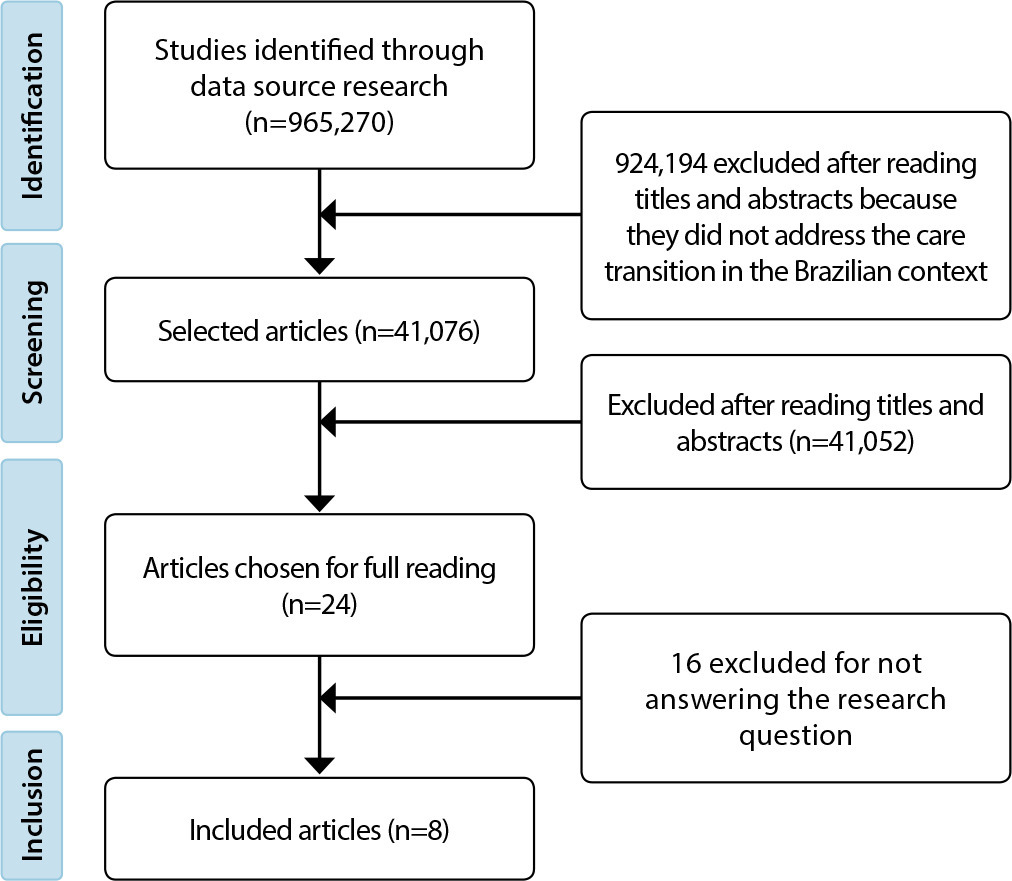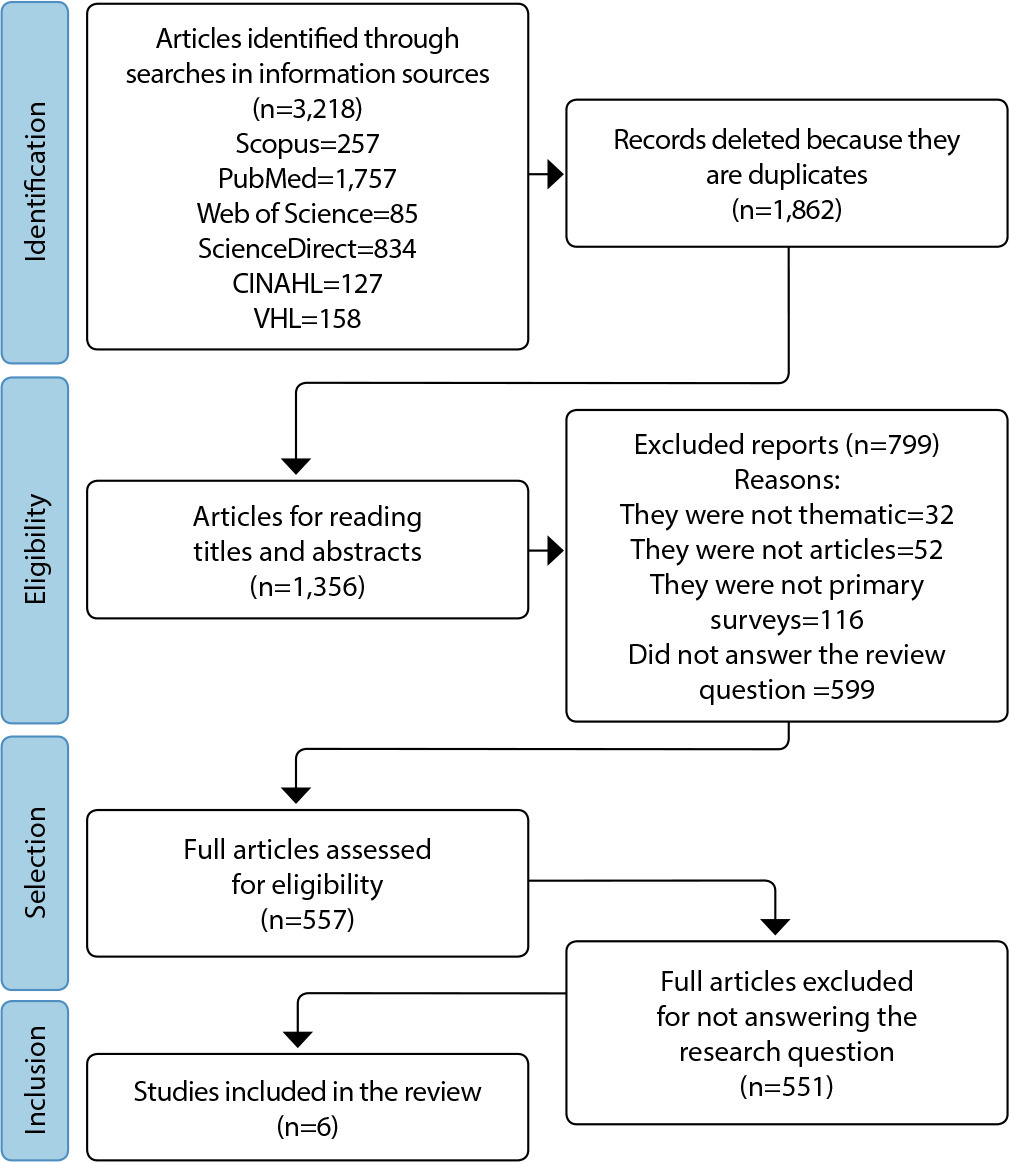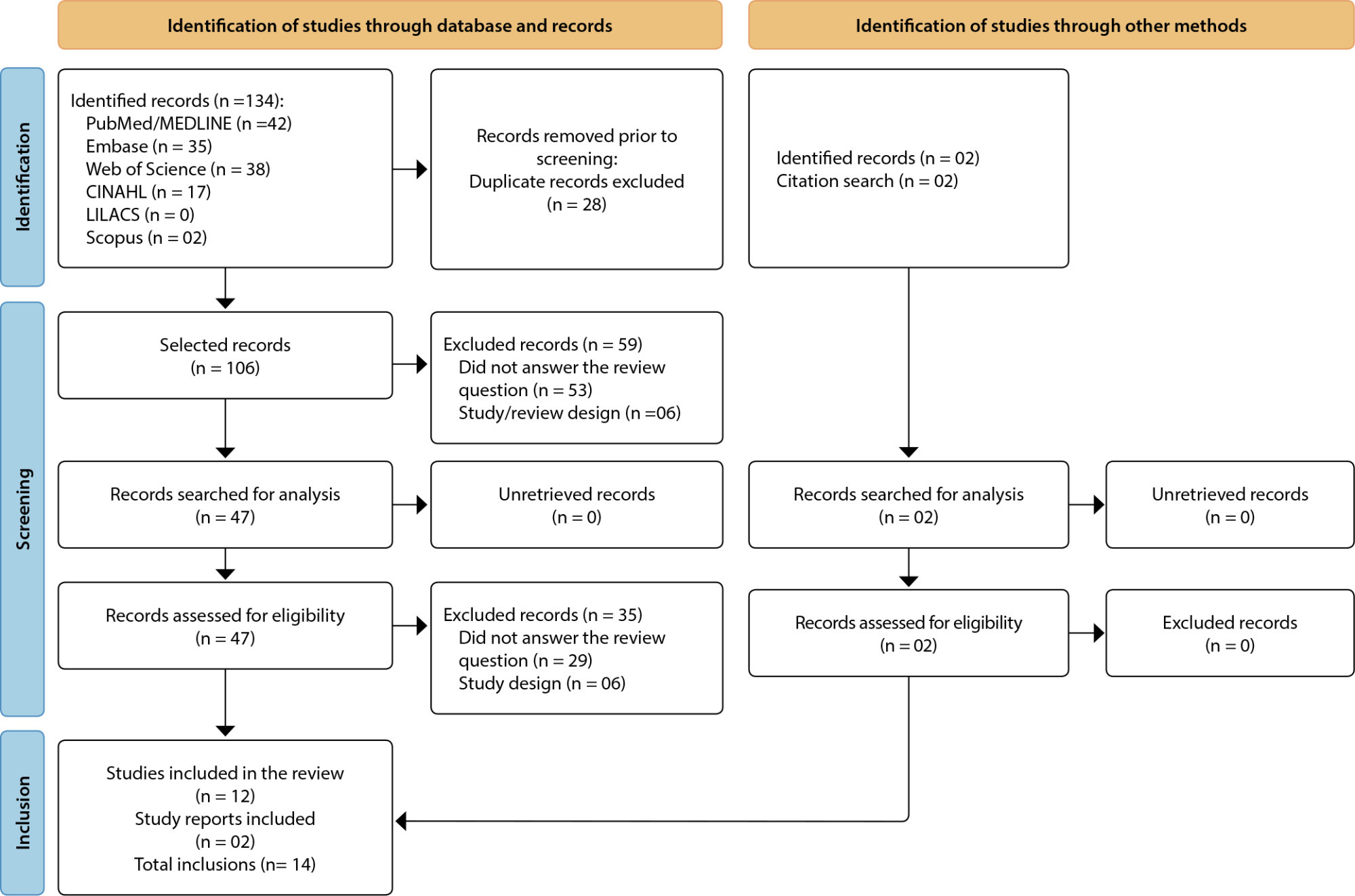-
ORIGINAL ARTICLE
Effect of cardiovascular biofeedback on nursing staff stress: a randomized controlled clinical trial
Revista Brasileira de Enfermagem. 2023;76(6):e20230069
12-04-2023
Abstract
ORIGINAL ARTICLEEffect of cardiovascular biofeedback on nursing staff stress: a randomized controlled clinical trial
Revista Brasileira de Enfermagem. 2023;76(6):e20230069
12-04-2023DOI 10.1590/0034-7167-2023-0069
Views0See moreABSTRACT
Objective:
to assess the effect of cardiovascular biofeedback on nursing staff stress when compared to an activity without self-monitoring.
Method:
a randomized controlled clinical trial, carried out with nursing professionals from a university hospital. The intervention group (n=58) performed cardiovascular biofeedback, and the control (n=57) performed an online puzzle without self-monitoring, totaling nine meetings over three weeks. The outcome was assessed using the Stress Symptoms and Work-Related Stress scales, and the biological marker heart rate variability. The generalized estimating equations method was used.
Results:
the intervention had no effect on self-reported instruments (p>0.050). However, there was an effect of time (p<0.050) on all heart rate variability indicators, demonstrating changes over the sessions.
Conclusion:
cardiovascular biofeedback showed promising results in the biological marker, suggesting that it can be used in nursing staff as a complementary therapy by promoting better autonomic nervous system regulation.

-
Transition of Care for Individuals with Mental Disorders in Brazil: A Contextual Analysis
Revista Brasileira de Enfermagem. 2023;76(6):e20230063
12-04-2023
Abstract
Transition of Care for Individuals with Mental Disorders in Brazil: A Contextual Analysis
Revista Brasileira de Enfermagem. 2023;76(6):e20230063
12-04-2023DOI 10.1590/0034-7167-2023-0063
Views0See moreABSTRACT
Objective:
To describe the contexts of care transition for individuals with mental disorders in the Brazilian setting.
Methods:
A contextual analysis was conducted through a scoping review. The search for studies was conducted in databases and thesis and dissertation portals, and the analysis was based on immediate, specific, general, and meta-contexts.
Results:
The sample, consisting of eight studies, indicated that the following factors are present in the contexts where care transition occurs: Peculiarities of care transition for individuals with mental disorders; Perspectives that can strengthen or weaken this transition; Approaches proposed in the past for the development of care transition; and Elements related to Brazilian legislation.
Final Considerations:
It is observed that the transition of care for individuals with mental disorders in Brazil takes place in various contexts of care levels. These variations present significant potentials and barriers in the care scenarios.

-
ORIGINAL ARTICLE
Sexual behavior according to undergraduate students: perspective of cross-cultural nursing and intersectional framing
Revista Brasileira de Enfermagem. 2023;76(6):e20220786
12-04-2023
Abstract
ORIGINAL ARTICLESexual behavior according to undergraduate students: perspective of cross-cultural nursing and intersectional framing
Revista Brasileira de Enfermagem. 2023;76(6):e20220786
12-04-2023DOI 10.1590/0034-7167-2022-0786
Views0ABSTRACT
Objective:
to discuss undergraduate students’ sexual behavior from the perspective of social markers and cross-cultural care proposed by Madeleine Leininger.
Methods:
descriptive-exploratory qualitative research, with a theoretical-philosophical foundation in the Transcultural Theory. Convenience sample was composed of 57 young people from two universities in Rio de Janeiro. The focus groups’ content were analyzed lexically using the IRAMUTEQ software.
Results:
four classes emerged: Young people’s sexual scripts: between the fear of an unplanned pregnancy and the risk of exposure to sexually transmitted infections; Affective relationships: trust in steady sexual partners, apparent sense of security and disuse of condoms; Sexual practices, gender and cultural determinants: distinction in men’s and women’s role; Sexual partnerships, negotiation of condom use and vulnerability to sexually transmitted infections.
Final considerations:
challenges are perceived for the attention to undergraduate students’ sexual health, who verbalized risky sexual behaviors due to sociocultural vulnerabilities.
Keywords:Cross-Cultural NursingIntersectional FramingSexual BehaviorSexually Transmitted InfectionsYoung AdultSee more
-
Sleep quality of nurses who worked in coping with COVID-19: an integrative review
Revista Brasileira de Enfermagem. 2023;76(6):e20230007
12-04-2023
Abstract
Sleep quality of nurses who worked in coping with COVID-19: an integrative review
Revista Brasileira de Enfermagem. 2023;76(6):e20230007
12-04-2023DOI 10.1590/0034-7167-2023-0007
Views0See moreABSTRACT
Objective:
to analyze sleep quality of nurses who worked coping with COVID-19 in scientific evidence.
Methods:
an integrative review, carried out in seven databases, including studies between December 2021 and June 2022, without language restrictions. The sample consisted of 15 primary studies.
Results:
nurses working in hospital, intensive care, outpatient care and teaching institutions constitute a vulnerable group for sleep disorders: latency, duration, efficiency and quality. The disorders identified involved insomnia at varying levels of severity: daytime dysfunction and morning sleepiness. Night work and low capacity for self-care were determinants of impaired sleep patterns.
Final considerations:
the COVID-19 pandemic contributed to greater vulnerability of nurses to changes in sleep, requiring strategies for risk management and well-being promotion.

-
ORIGINAL ARTICLE
Work and Mental Distress among Nurses in the Amazon Region of Brazil during the COVID-19 Pandemic
Revista Brasileira de Enfermagem. 2023;76(6):e20220792
12-04-2023
Abstract
ORIGINAL ARTICLEWork and Mental Distress among Nurses in the Amazon Region of Brazil during the COVID-19 Pandemic
Revista Brasileira de Enfermagem. 2023;76(6):e20220792
12-04-2023DOI 10.1590/0034-7167-2022-0792
Views0See moreABSTRACT
Objective:
To assess the relationship between psychopathological symptoms and the social, clinical, and occupational profile of nurses in the Amazon region of Brazil during the COVID-19 pandemic.
Methods:
A descriptive cross-sectional online study was conducted in 2020 with 261 nurses. The Symptom Assessment Scale-40 was utilized.
Results:
The presence of pre-existing conditions before the pandemic was associated with psychotism (p=0.044). Experiencing constraints and/or violence at work during the pandemic was associated with somatization (p=0.025), and working hours were associated with anxiety (p=0.025). Nurses predominantly exhibited symptoms related to fear (33.7%), tension (34.5%), and a sense that something is wrong in the mind (22.6%).
Conclusions:
A significant association was observed between working hours and anxiety symptoms, the experience of constraints and/or violence at work during the COVID-19 pandemic and somatization symptoms, as well as between pre-existing conditions and psychotism symptoms related to COVID-19.
-
Simulation training of caregivers at hospital discharge of patients with chronic diseases: an integrative review
Revista Brasileira de Enfermagem. 2023;76(6):e20230043
12-04-2023
Abstract
Simulation training of caregivers at hospital discharge of patients with chronic diseases: an integrative review
Revista Brasileira de Enfermagem. 2023;76(6):e20230043
12-04-2023DOI 10.1590/0034-7167-2023-0043
Views0See moreABSTRACT
Objective:
to identify evidence about the use and effects of clinical simulation for preparing caregivers for discharging patients with chronic conditions.
Methods:
an integrative peer review in the Scopus, PubMed, Web of Science, Cumulative Index to Nursing and Allied Health Literature, ScienceDirect and Virtual Health Library databases, from July to September 2022.
Results:
3,218 studies were identified, with a final sample consisting of four national and two international articles. Using simulation as an educational technology contributed to caregiver preparation in home care. In most studies, using clinical simulation included using other strategies to complement training: expository dialogued class, conversation circle and audiovisual resources.
Final considerations:
simulation proved to be efficient for training caregivers, with the active participation of family members and nurses in health education actions.

-
ORIGINAL ARTICLE
Feelings about birth by a group of high-risk pregnant women
Revista Brasileira de Enfermagem. 2023;76(6):e20230059
12-04-2023
Abstract
ORIGINAL ARTICLEFeelings about birth by a group of high-risk pregnant women
Revista Brasileira de Enfermagem. 2023;76(6):e20230059
12-04-2023DOI 10.1590/0034-7167-2023-0059
Views0See moreABSTRACT
Objective:
to understand feelings about birth among a group of high-risk pregnant women.
Method:
a descriptive and qualitative study, using Alfred Schütz’s social phenomenology as a philosophical theoretical framework. The study included 25 pregnant women undergoing high-risk prenatal care. The interview had the following guiding questions: tell me about your feelings regarding the moment of birth/childbirth; How do you deal with the high-risk diagnosis? What are your expectations for birth/childbirth?
Results:
five categories emerged: Fear of obstetric care; Fear of complications with the baby; Fear of cesarean section; Resilience in the face of high-risk pregnancy; and Expectations for birth.
Considerations:
high-risk pregnant women are afraid of the care they will receive, the risks and concern about the baby’s vitality at birth. The importance of care is emphasized, with a welcoming environment, bonding and communication between health team and pregnant woman.
-
ORIGINAL ARTICLE
The nursing practice environment and hospital sociotechnical complexity: a mixed-methods study
Revista Brasileira de Enfermagem. 2024;77(6):e20230315
12-16-2024
Abstract
ORIGINAL ARTICLEThe nursing practice environment and hospital sociotechnical complexity: a mixed-methods study
Revista Brasileira de Enfermagem. 2024;77(6):e20230315
12-16-2024DOI 10.1590/0034-7167-2023-0315
Views1See moreABSTRACT
Objectives:
to analyze the relationship between the nursing practice environment and hospital sociotechnical complexity as perceived by nurses.
Methods:
a sequential explanatory mixed-methods study was conducted in a hospital in southern Brazil. The Brazilian version of the Practice Environment Scale-Nursing Work Index and the Complexity Characterization Questionnaire were administered to 132 nurses. Subsequently, semi-structured interviews were conducted with 18 participants, and the data were subjected to thematic analysis. Data integration was achieved through a connection approach.
Results:
the nursing practice environment was found to be favorable, except in the subscale concerning Staffing and Resource Adequacy, where complexity was present in the activities. The three emerging categories explained human and technical aspects related to complexity in the practice environment, quality of care, and patient safety. Unexpected variability was inversely correlated with the practice environment.
Conclusions:
the study results indicate a relationship between these constructs, with implications for the quality and the safety of care.

-
REVIEW
Recommendations for guidelines for promoting mental health in the workplace: an umbrella review
Revista Brasileira de Enfermagem. 2024;77(6):e20240086
12-16-2024
Abstract
REVIEWRecommendations for guidelines for promoting mental health in the workplace: an umbrella review
Revista Brasileira de Enfermagem. 2024;77(6):e20240086
12-16-2024DOI 10.1590/0034-7167-2024-0086
Views1See moreABSTRACT
Objectives:
to summarize the recommendations of guidelines for promoting mental health in the workplace.
Methods:
an umbrella review, according to Joanna Briggs Institute and Preferred Reporting Items for Systematic reviews and Meta-Analyses methodological assumptions. Data collection was carried out in January 2021 and updated in July 2023 in the American Psychological Association, Cochrane Library, EMBASE, National Library of Medicine, and Scopus databases. Systematic reviews that assessed guidelines with recommendations for mental health care for workers were included. PROSPERO registration CRD42023461845.
Results:
four systematic reviews published between 2015 and 2018 were identified. The abstracts highlighted actions that facilitate and inhibit the recommendations as well as three categories of intervention: primary prevention – worker protection; secondary prevention – promoting workers’ mental health; and tertiary prevention – supporting, monitoring and rehabilitating workers upon returning to work.
Conclusions:
the interventions are based on prevention, promotion and early recognition, support and rehabilitation of mental health problems.

-
ORIGINAL ARTICLE
Mental health of nursing in coping with COVID-19 at a regional university hospital
Revista Brasileira de Enfermagem. 2020;73:e20200434
07-13-2020
Abstract
ORIGINAL ARTICLEMental health of nursing in coping with COVID-19 at a regional university hospital
Revista Brasileira de Enfermagem. 2020;73:e20200434
07-13-2020DOI 10.1590/0034-7167-2020-0434
Views0See moreABSTRACT
Objective:
to identify prevalence and factors associated with anxiety and depression in nursing professionals who work to cope with COVID-19 at a university hospital.
Methods:
a cross-sectional observational study using a sociodemographic questionnaire and Hospital Anxiety and Depression Scale, with 88 nursing professionals. Data were analyzed using absolute and relative frequency and Statistical Package for the Social Sciences.
Results:
there was prevalence of anxiety (48.9%) and depression (25%). The majority of the sample consisted of women over 40 years old, married or in a common-law marriage, white, with higher education or graduate degree, with an income above 3,000.00 reais, public servants, working 40 hours a week and working in the hospital from 1 to 5 years.
Conclusion:
we must consider the impact on mental health nursing caused by COVID-19 and intervene with coping strategies to minimize the suffering of professionals.
-
REFLECTION
Thematic content analysis using ATLAS.ti software: Potentialities for researchs in health
Revista Brasileira de Enfermagem. 2020;73(3):e20190250
04-22-2020
Abstract
REFLECTIONThematic content analysis using ATLAS.ti software: Potentialities for researchs in health
Revista Brasileira de Enfermagem. 2020;73(3):e20190250
04-22-2020DOI 10.1590/0034-7167-2019-0250
Views0See moreABSTRACT
Objective:
to describe the most important tools of ATLAS.ti Software and to associate them with the procedures of Thematic Content Analysis.
Method:
It is a theoretical reflection of the Content Analysis phases of Laurence Bardin, associating them with software tools Atlas.ti and showing its usefulness for data analysis in qualitative research.
Results:
historical contextualization and the available resources of Atlas.ti software with presentation of health research involving the phases of thematic content analysis.
Final considerations:
The Atlas.ti software assists in the accomplishment of the thematic content analysis being this promising association in health research.

-
REFLECTION
Nursing education: challenges and perspectives in times of the COVID-19 pandemic
Revista Brasileira de Enfermagem. 2020;73:e20200683
10-26-2020
Abstract
REFLECTIONNursing education: challenges and perspectives in times of the COVID-19 pandemic
Revista Brasileira de Enfermagem. 2020;73:e20200683
10-26-2020DOI 10.1590/0034-7167-2020-0683
Views0See moreABSTRACT
Objective:
To discuss the challenges and perspectives of nursing education in times of the COVID-19 pandemic.
Methods:
Reflection study, with theoretical approach based on national and international publications, allied to the experience of researchers in the area of nursing education.
Results:
Four sections are identified: Nursing education: current affairs and perspectives; Education and technologies in time of pandemic: acceleration, alteration and paralysis; Difference between emergency, intentional and remote teaching; the return to the “new normality”: new structuring axes and legal norms.
Final considerations:
The conclusion is that longstanding challenges have emerged with the pandemic, and the processes of acceleration, change and paralysis have marked education in these times. Moreover, epidemiological, technological and psychological aspects should be more valued in the return to activities.
-
ORIGINAL ARTICLE
Validation of a booklet on self-care with the diabetic foot
Revista Brasileira de Enfermagem. 2019;72(3):780-787
06-27-2019
Abstract
ORIGINAL ARTICLEValidation of a booklet on self-care with the diabetic foot
Revista Brasileira de Enfermagem. 2019;72(3):780-787
06-27-2019DOI 10.1590/0034-7167-2017-0900
Views0ABSTRACT
Objective:
to describe the validation of the booklet on self-care with the feet of people with diabetes.
Method:
methodological study, focusing on the validation of a printed booklet. The content and appearance of the booklet was validated by 23 judges divided into three groups: 11 content and appearance, seven technicians and five of the area of design and marketing. The appearance was validated by 30 people with type 2 Diabetes Mellitus.
Results:
the judges in the nursing area allowed the validation of material with a Content Validity Index (CVI) of 0.99, judges in the area of design and marketing with Suitability Assessment of Materials (SAM) of 99.2% and the target audience with concordance index of 99.4%.
Conclusion:
the educational booklet proved to be valid and reliable educational material to be used in order to promote compliance with self-care with the feet of people with Diabetes Mellitus.
Keywords:Diabetes Mellitus Type 2Diabetic FootEducational TechnologyTeaching MaterialsValidation StudiesSee more
-
ORIGINAL ARTICLE
Braden Scale in pressure ulcer risk assessment
Revista Brasileira de Enfermagem. 2020;73(6):e20190413
08-10-2020
Abstract
ORIGINAL ARTICLEBraden Scale in pressure ulcer risk assessment
Revista Brasileira de Enfermagem. 2020;73(6):e20190413
08-10-2020DOI 10.1590/0034-7167-2019-0413
Views0See moreABSTRACT
Objective:
To analyze the applicability of the Braden Scale to individuals admitted to an Intensive Care Unit (ICU) with the nursing diagnosis Impaired Physical Mobility, in its prediction potential to develop pressure ulcer (PU).
Methods:
A cross-sectional, quantitative study that evaluated all patients hospitalized in an ICU between November 2016 and February 2017, with the Braden Scale.
Results:
The prevalence of PU was 35.8% (24/67), in male individuals 58.3% (14/24), diagnosed with ischemic CVA 51.9% (12/27), and with hemorrhagic CVA 7.4% (2/27). Among patients classified at severe risk of developing pressure ulcer, 83.3% (20/53) developed it, and 76.7% (33/53) did not develop it.
Conclusion:
The performance of the Braden Scale showed a balance between sensitivity and specificity, confirming it as a better predictive risk assessment instrument in this group of patients.
-
ORIGINAL ARTICLE
Prevalence of symptoms and quality of life of cancer patients
Revista Brasileira de Enfermagem. 2020;73(2):e20180287
02-27-2020
Abstract
ORIGINAL ARTICLEPrevalence of symptoms and quality of life of cancer patients
Revista Brasileira de Enfermagem. 2020;73(2):e20180287
02-27-2020DOI 10.1590/0034-7167-2018-0287
Views0See moreABSTRACT
Objectives:
to analyze the prevalence of symptoms and their relationship with the quality of life of cancer patients.
Methods:
this is a cross-sectional study with 107 patients evaluated using a sociodemographic instrument, the hospital anxiety and depression scale (HADS) and the quality of life scale (EORTC-QLQ-C30). Pearson’s correlation test was used to evaluate the relationship between symptoms and quality of life.
Results:
prevalence of female patients (56.1%), 55 years as the mean age and 10 years of schooling. Fatigue (76.6%), insomnia (47.7%), pain (42.1%), loss of appetite (37.4%), anxiety (31.8%) and depression (21.5%) were identified. Anxiety and depression symptoms presented a negative correlation with quality of life and positive correlation with physical symptoms.
Conclusions:
fatigue, insomnia, pain and loss of appetite were the most common and most intense symptoms. Anxiety and depression symptoms presented a negative correlation with quality of life and positive correlation with physical symptoms.
-
REVIEW
Strategies of active learning methodologies in nursing education: an integrative literature review
Revista Brasileira de Enfermagem. 2021;74(1):e20200130
03-24-2021
Abstract
REVIEWStrategies of active learning methodologies in nursing education: an integrative literature review
Revista Brasileira de Enfermagem. 2021;74(1):e20200130
03-24-2021DOI 10.1590/0034-7167-2020-0130
Views0See moreABSTRACT
Objectives:
to analyze the scientific evidence on the strategies of active learning methodologies used in the training of nurses, as well as their contributions and obstacles in training.
Methods:
integrative literature review conducted with 33 selected articles in the Medical Literature Analysis and Retrieval System Online, Latin American and Caribbean Literature in Health Sciences, Nursing Database, Scopus, Web of Science and Education Resources Information Center databases.
Results:
among the strategies, simulation, problem-based learning and flipped classroom were highlighted. The active search, the integration of theory and practice and group work were examples of contributions to the training of nurses. However, the lack of preparation of the actors and the lack of structural support contribute to the dissatisfaction of the students.
Final Considerations:
the active learning methodology places the student at the heart of the learning process, favors critical thinking and the ability to make decisions.
Search
Search in:
Nuvem de Tags
Aged (144) Atenção Primária à Saúde (239) COVID-19 (104) Cuidados de Enfermagem (269) Educação em Enfermagem (151) Educação em Saúde (139) Enfermagem (930) Estudos de Validação (131) Health Education (144) Idoso (208) Mental Health (149) Nursing (987) Nursing Care (306) Patient Safety (151) Primary Health Care (284) Qualidade de Vida (104) Quality of Life (106) Saúde Mental (145) Segurança do Paciente (150) Validation Studies (108)




